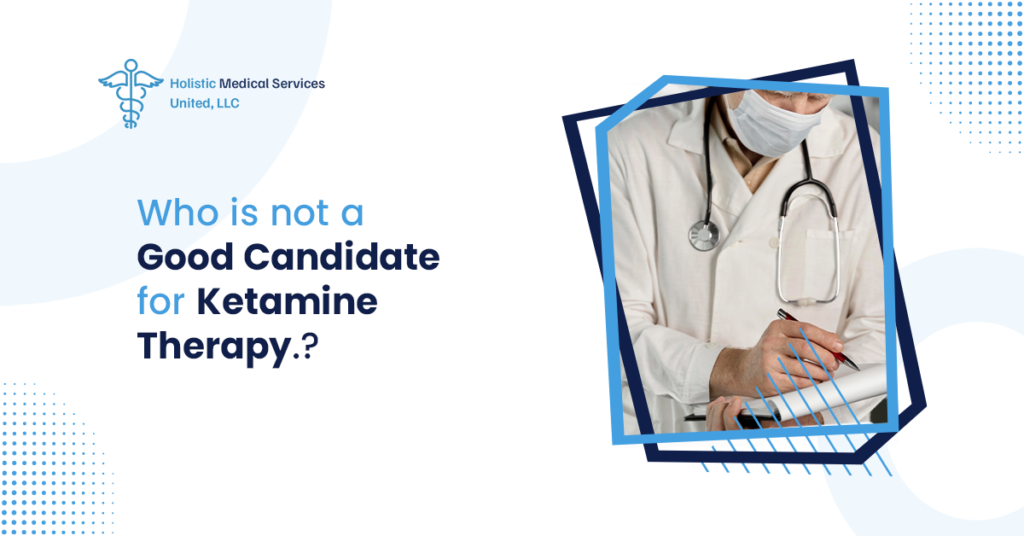Ketamine therapy has gained attention as a promising treatment for depression, anxiety, PTSD, and chronic pain. While many people benefit from this therapy, it is not suitable for everyone. Certain medical conditions, psychological factors, and lifestyle habits can make ketamine therapy risky or ineffective. Understanding who is not a good candidate for ketamine therapy is crucial to ensuring safety and positive treatment outcomes. In this article, we will explore the conditions that may disqualify someone from receiving ketamine therapy and alternative options for those who may not be eligible.
What Is Ketamine Therapy and How Does It Work?
Ketamine therapy involves the administration of low doses of ketamine, typically through an intravenous (IV) infusion, nasal spray, or other forms. Originally used as an anesthetic, ketamine has been found to have rapid-acting antidepressant and pain-relieving effects. It works by affecting neurotransmitters in the brain, particularly glutamate, which helps promote new neural connections.
Unlike traditional antidepressants that may take weeks to show results, ketamine often provides relief within hours or days. However, because ketamine alters brain chemistry, it must be administered under medical supervision to monitor for side effects and ensure the patient’s safety. While ketamine therapy has helped many people with treatment-resistant depression and chronic pain, it is not appropriate for everyone.
Who Should Avoid Ketamine Therapy?
While ketamine therapy is generally safe for many individuals, some people should avoid it due to potential risks. The following groups of people may not be good candidates for ketamine therapy:
- Those with a history of psychosis or schizophrenia
- Individuals with uncontrolled high blood pressure
- People struggling with active substance abuse
- Pregnant or breastfeeding women
- Children and young teenagers
- Seniors with certain medical conditions
Each of these groups faces unique risks that could make ketamine therapy unsafe or less effective. Below, we will explore these factors in more detail.
People with a History of Psychosis
Ketamine is a dissociative anesthetic, meaning it can cause hallucinations, altered perceptions, and feelings of detachment from reality. While these effects can be mild in some individuals, they can be dangerous for people with a history of psychosis, schizophrenia, or severe bipolar disorder with psychotic features.

Those with Uncontrolled High Blood Pressure
Ketamine can increase blood pressure and heart rate, which may be dangerous for people with hypertension. Individuals with well-managed high blood pressure may still be able to receive ketamine therapy under careful supervision, but those with uncontrolled hypertension should avoid it until their condition is stabilized.
Individuals with Substance Abuse Issues
While ketamine is used to treat depression and chronic pain, it has a potential for abuse. People with a history of addiction to drugs or alcohol may be at a higher risk of misusing ketamine. Some healthcare providers may still consider ketamine therapy for patients with a history of substance use disorder, but only under strict monitoring.
Medical Conditions That Make Ketamine Therapy Risky
Several medical conditions may increase the risks associated with ketamine therapy, including:
- Severe liver or kidney disease
- Unstable heart conditions, such as arrhythmias or heart failure
- A history of severe allergic reactions to ketamine
- Seizure disorders that are not well-managed
People with these conditions should consult their doctor before considering ketamine therapy, as the risks may outweigh the potential benefits.
Can Pregnant or Breastfeeding Women Get Ketamine Therapy?
There is limited research on the effects of ketamine therapy during pregnancy and breastfeeding. Since ketamine crosses the placenta and can be found in breast milk, it may pose risks to the baby. Until more research is available, most healthcare providers recommend that pregnant and breastfeeding women avoid ketamine therapy. If a pregnant or nursing mother is struggling with severe depression or chronic pain, alternative treatments should be explored with a doctor.
Are There Any Age Restrictions for Ketamine Therapy?
Most ketamine therapy clinics have age restrictions in place. Generally, ketamine therapy is not recommended for children and young teenagers. While some studies have explored ketamine use for adolescents with severe depression, it is still considered an experimental treatment for this age group.
Adults over the age of 18 are typically eligible for ketamine therapy if they meet other health criteria. However, younger patients should seek alternative treatments, such as therapy, medication, and lifestyle changes.
Is Ketamine Therapy Safe for Seniors?
Ketamine therapy can be beneficial for older adults, especially those with depression or chronic pain that has not responded to other treatments. However, seniors may have underlying health conditions that increase their risk of complications.

Medical Conditions That Make Ketamine Therapy Risky
Seniors with the following conditions should consult a doctor before considering ketamine therapy:
- Cardiovascular disease
- Kidney or liver dysfunction
- Neurological disorders, such as dementia or Parkinson’s disease
Since ketamine affects the central nervous system, seniors with cognitive impairments may experience worsened confusion or disorientation. Careful monitoring is required to ensure safety.
Those with Uncontrolled High Blood Pressure
High blood pressure is a common issue among seniors. Since ketamine can elevate blood pressure, older individuals with hypertension should work with their doctor to determine if it is safe for them.
What Is Ketamine Therapy and How Does It Work?
As mentioned earlier, ketamine therapy alters brain chemistry to relieve symptoms of depression, anxiety, PTSD, and chronic pain. Seniors interested in this therapy should seek a medical evaluation to assess their overall health and risk factors.
What to Do If You’re Not a Good Candidate for Ketamine Therapy?
If you are not a good candidate for ketamine therapy, there are other treatment options available. Some alternatives include:
- Traditional Antidepressants – Medications like SSRIs and SNRIs can be effective for many people with depression.
- Cognitive Behavioral Therapy (CBT) – Talk therapy can help address negative thought patterns and improve mental health.
- Transcranial Magnetic Stimulation (TMS) – A non-invasive treatment that uses magnetic fields to stimulate brain activity.
- Lifestyle Changes – Regular exercise, a healthy diet, and good sleep hygiene can significantly impact mental health.
- Other Emerging Therapies – Research into psychedelics like psilocybin and MDMA for mental health treatment is ongoing.
If ketamine therapy is not right for you, consult a healthcare provider to explore other treatment options tailored to your needs.
The Bottom Line
Ketamine therapy has shown promising results for many people struggling with depression, anxiety, PTSD, and chronic pain. However, it is not suitable for everyone. Individuals with a history of psychosis, uncontrolled high blood pressure, substance abuse issues, certain medical conditions, or those who are pregnant or breastfeeding may not be good candidates for ketamine therapy.
Before starting any treatment, it’s essential to consult a qualified healthcare provider who can assess your individual health risks and recommend the best approach for your condition. If ketamine therapy isn’t right for you, there are many alternative treatments available to help improve mental health and well-being.







